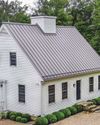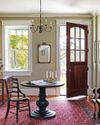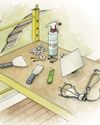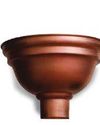
“We wanted something a little neglected, but not changed,” Rosemarie Padovano says of the old-house search she undertook with Marcello Marvelli. The couple had no interest in taking on a complete restoration, nor did they relish unraveling work “done by somebody who had too much money and too little taste,” as Marcello puts it. The two had discovered Old Lyme, Connecticut, when they spent time on their sailboat in Stonington Harbor nearby. Beginning to tire of city life in Brooklyn, they began a search for an artistic old house.
Rosemarie Padovano is a sculptor and interior designer. Marcello Marvelli is an antiques dealer and art historian with a Ph.D. in Medieval and Renaissance art from the University of Florence in his native Italy. Aesthetics were important. It took two years, but finally, they found a 1755 Colonial-era house in Old Lyme. Home to generations of the Wade family until 1922, the Wade–Tinker house had never been altered in any significant way. It was structurally sound, so the couple could spend their creativity, hard work, and money on light renovating and furnishing.
They were thoughtful about the process; as experienced designers, they know full well what adds value and what does not. “When I work with clients, half of my job is advising on what we can do, aesthetically or functionally, to help them to enjoy their house more,” Rosemarie says. The kitchen in this house is a case in point. Rather than gutting it or even buying new cabinets, the couple added a fresh coat of paint, and swapped out 20th-century chrome hardware and faucets for unlacquered brass that would acquire a patina. An unattractive island that had taken up most of the room was “decommissioned with a sledgehammer” and replaced with an antique worktable bought at a country auction. They painted the pine floor white and stenciled it in a diamond pattern.
This story is from the {{IssueName}} edition of {{MagazineName}}.
Start your 7-day Magzter GOLD free trial to access thousands of curated premium stories, and 9,000+ magazines and newspapers.
Already a subscriber ? Sign In
This story is from the {{IssueName}} edition of {{MagazineName}}.
Start your 7-day Magzter GOLD free trial to access thousands of curated premium stories, and 9,000+ magazines and newspapers.
Already a subscriber? Sign In

Navigating the Lumberyard - Here's some lumber lingo you should know before you venture into a lumberyard.
Here's some lumber lingo you should know before you venture into a lumberyard. Almost everyone fixing an old house will end up at a lumberyard-whether it's a local supplier or the organized aisles of a big-box home-improvement store.

a farmhouse renewed
Sensitive renovations and restoration work preserved a house that dates to 1799.

AN OVERVIEW OF METAL ROOFING
METAL ROOFS ARE RESURGENT, FOR GOOD REASONS.

ENDURING BEAUTY IN WALLS of STONE
Now back in the family who had been here since 1830, the old farmhouse is again ready for generations to come. Additions dating to 1840 and the 1950s were preserved.

ARCHITECTURAL DETAILS COME TO LIFE
Owners and their designer celebrate the unique features of a 1912 Arts & Crafts Tudor.

For a Wet Basement Wall
If there's problem common to old houses, it's a wet basement. I'm not talking about occasional flooding, but rather a basement that apparently seeps or leaks after even a rain shower or during snowmelt. Several approaches are available; sustainable solutions will get to the root of the problem.

Patching a Plaster Wall
Fix a hole in the wall with a few common tools and some drywall supplies. Practice your technique!

Roofing & Siding
Make note of these historical and unusual materials for the building envelope.

The Riddle of the water
When water incursion happens, the roof isn't necessarily the culprit. Maybe snaking a drain line, or clearing debris from a clogged gutter, temporarily will stem a leak. But a recurring problem usually means other forces are at work. It takes persistence-and a team with the right skills and patience—to identify the source and apply a solution.

Light-filled Craftsman Redo
For a dark kitchen in a 1914 Illinois house, the trick was anchoring white expanses with woodsy warmth.